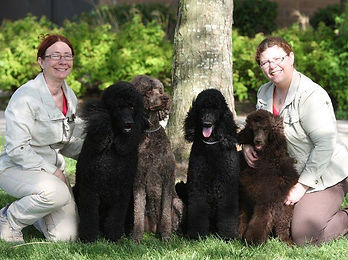
Piccolo's AKC Standard Poodles
Piccolo's AKC Standard Poodles
Members Area
Recent Photos
Recent Videos
Health and Genetic Testing
"Standard Poodle eyes have the power to speak a great language." -Martin Buber
Just like any dog breed, the Poodle is subject to various genetic disorders. For diseases that are limited to phenotypic evaluations, there are no guarantees. However, the probability that an animal will develop an inherited disease is reduced when its ancestry has been tested normal. We believe very strongly in full health screening using the latest testing methods. We also actively participate in various health research and studies whenever possible. The Orthopedic Foundation for Animals (OFA) and the Canine Health Information Center (CHIC) work with parent clubs to establish important screening criteria for each AKC breed.
For Standard Poodle puppies, the Poodle Club of America recommends the following genetic testing of both parents:
- OFA certification of hips
- Eye exam by ACVO veterinary Ophthalmologist
- Health elective of one of the following:
- OFA thyroid evaluation from an OFA approved laboratory
- OFA sebaceous adenitis evaluation from an approved Dermatopathologist
- Heart evaluation by an ACVIM boarded veterinary Cardiologist
- Neonatal Encephalopathy
- vonWillebrand's Disease

The Canine Health Information Center (CHIC) breed requirements for the Standard Poodle include:
- OFA hip dysplasia
- eye examination by a boarded ACVO ophthalmologist
- Health elective of one of the following:
- OFA thyroid evaluation by from an approved laboratory
- OFA sebaceous adenitis evaluation from an approved dermapathologist
- Congenital cardiac exam
- Advanced cardiac exam
When searching for a reputable breeder and puppy, we strongly recommend verifying all testing results of both parents through the OFA. These are the leading orthopedic and genetic certification organizations. They track the health history to assist in breeding healthy dogs. Responsible breeders have an inherent responsibility to breed healthy dogs.
OFA and CHIC
Founded in 1966, the Orthopedic Foundation for Animals is a non-profit organization that collates and disseminates information concerning orthopedic and genetic disease of animals. The OFA's mission is to improve the health and well being of companion animals through a reduction in the incidence of genetic disease. The Canine Health Information Center is a centralized canine health database jointly sponsored by the AKC/Canine Health Foundation (AKC/CHF) and the Orthopedic Foundation for Animals (OFA). CHIC's mission is to provide a source of health information for owners, breeders, and scientists, which will assist in breeding healthy dogs. As a potential puppy buyer, the CHIC program provides accurate information about the results of a breeder's health testing. Core to the CHIC philosophy is the realization that each breed has different health concerns. Breed specific requirements typically consist of the inherited diseases that are of the greatest concern and for which some screening test is available. CHIC breed requirements for the Standard Poodle include hip dysplasia, eye clearance, and one health elective of either thyroid, sebaceous adenitis, or cardiac evaluation.

Genetic Diversity VGL
University of California Davis scientific research has proven that Poodles with 'typical' genetics have higher risks for autoimmune diseases - which cannot be detected and avoided using typical 'single gene' tests. We know for a fact that breeders can reduce risk in their puppies by breeding 'away from the cluster' and incorporating more unusual Poodle DNA in their breeding programs. Poodle breeders are lucky that our breed still has small pockets of unusual dogs. However it's nearly impossible to know which dogs are unusual, or which dogs are unrelated, just by looking at their pedigrees. Dogs can be highly related and yet have very different looking pedigrees. On the other hand, dogs can have very similar pedigrees but may be genetically very different. The UC Davis test and BetterBred platform let breeders SEE the individual genetic similarities and differences of each dog they intend to breed, instead of being forced to guess. With this information, they can plan safer matches that will result in generally healthier puppies. They can also deliberately preserve important DNA to ensure a healthier future for the whole breed. Greater genetic diversity reduces the likelihood of autoimmune and other diseases. An increase in genetic diversity decreases complex autoimmune disorders and other complex diseases. More information on this groundbreaking genetic research can be found at https://www.vgl.ucdavis.edu/services/dog/GeneticDiversityInStandardPoodles.php and https://www.betterbred.com/.

Supporting Health Research
We have participated in several health research studies to support continual improvement toward creating healthier puppies. These studies have included research on Addison's Disease, color genetics, and birth weights.
We also are a member of the the AKC Canine Health Foundation and contribute financially to research on an annual basis. The AKC Canine Health Foundation is dedicated to advancing the health of all dogs and their owners by funding scientific research and supporting the dissemination of health information to prevent, treat and cure canine disease. More information is available at AKC CHF.
